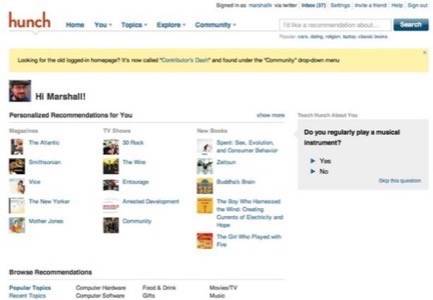Hunch was never a social Q&A service, though many press outlets have confused it for one. The service, founded by Flickr co-founder Caterina Fake and super-hot angel investor Chris Dixon, has relaunched its home page and is now more clearly positioned than ever as a taste-graph driven recommendation engine. That might sound confusing, but the new home page is actually drop-dead simple.

Log in with your Twitter or Facebook account, answer as few as 20 quick and addictive taste-evaluation questions, and Hunch will turn the front page of the site into a list of highly targeted personal recommendations of movies, books, magazines, computers, meals, vacation destinations and more. It’s really impressive.

Above: My new Hunch home page, click for full-size view.
Hunch is well-known for its “Tell Hunch About Yourself” feature, where thousands of users have answered hundreds of questions each about themselves. All kinds of correlations can be drawn from comparing these responses. People who are comfortable with public drinking fountains, for example, are much more likely to say they’d be willing to risk their lives for a stranger, Hunch has found.
Now Hunch uses that data and more to “personalize the internet.” It’s a smart change in emphasis.
Where do the recommendations come from? As far as I can tell, the magazine recommendations for example reflect the magazines that people with similar taste as I have (about seemingly random things) and people I’m friends with on Twitter or Facebook have said they like when looking for a magazine.
If you’ve tried the company’s experimental Twitter predictor game, which guesses how you’ll answer some very personal questions, based on who you are friends with on Twitter, you’ve gotten a taste for just how effectively Hunch can look into your mind and soul.
With this relaunch of the home page, the company has cut to the chase and put its most successful features front and center. It’s a smart move and one that will make Hunch far more comprehensible and immediately useful.
Co-founder Dixon wrote a blog post six weeks ago on his personal site about how helpful it can be for a startup to pivot. “Ask yourself: if you started over today, would you build the same product?” he wrote.
“If not, consider significant changes to what you are building…You aren’t throwing away what you’ve learned or the good things you’ve built. You are keeping your strong leg grounded and adjusting your weak leg to move in a new direction.”

















